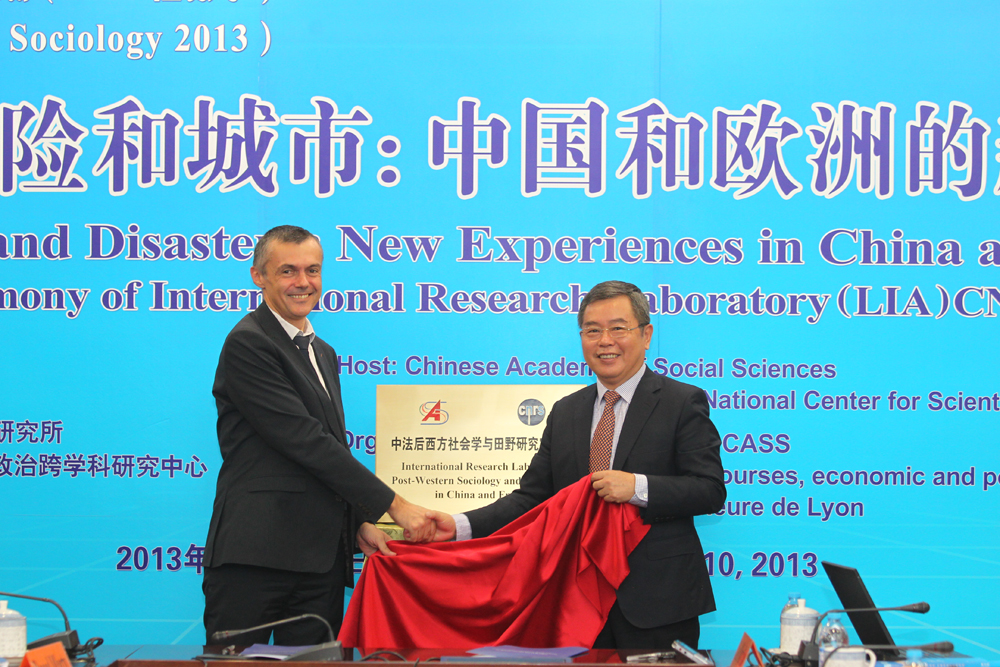
Cérémonie d’ouverture du LIA en Chine, co-organisée par l’Académie des Sciences Sociales de Chine, Institut de sociologie et le CNRS, Triangle : « Traditions, controversies and trajectories of sociologies in France and in China »
9 novembre 2013 à la CASS à Pékin, Chine
Résumé
- Brochure/Booklet : Téléchargez/Download.
Une première cérémonie d’ouverture du LIA aura lieu en Chine à la CASS à Pékin les 9 et 10 novembre 2013.Une seconde cérémonie d’ouverture du LIA aura lieu en France à l’ENS de Lyon les 23 et 24 janvier 2014.
Nous ouvrirons le LIA à Pékin avec un premier Colloque Traditions, controversies and trajectories of sociologies in France and in China le 9 novembre.
Présentation/Presentation
This conference aims to reveal the dynamics of knowledge exchange, evaluation and hybridisation that have developed beyond the hegemonic Western models, disrupting and challenging them. This approach will enable us to identify the points at which sociologies constructed in France and those produced in China meet, overlap and cross-fertilise each other ( Roulleau-Berger, 2011, Roulleau-Berger, Li Peilin, 2012). As knowledge circulates and becomes globalised, so new centres and new peripheries are formed, giving rise in turn to new hierarchies that emerge discreetly and in which rivals compete to develop innovative knowledge. The centres in which new knowledge in the human sciences is being produced have shifted towards Asia, where intellectuals – and sociologists in particular – have reacted to Eurocentric fundamentalism and a methodological nationalism (Beck, 2004) that places non-Western theories in subordinate positions, banishing them to ‘the outer reaches of knowledge’. The challenge that has developed over the past 20 years is a major one, revolving as it does around the question of the international recognition of non-Western knowledge in order to make progress in the production of new knowledge about local societies and global society.
The project concerns paradigms and theoretical methodology in the field of sociology in France and in China. This choice also makes sense in the light of the reconstruction of Chinese sociology since 1979. In France, marxism has lost most of its dynamism, structuralism has faded in importance, critical thinking has become hypercritical, the need to conceptualise sociological objects ‘globally’ has been asserted, the Subject has risen to prominence, the Grand Theories have declined and the grand paradigms have fragmented (Wieviorka, 2007). In France since the end of the 1970s, the constructivist and hermeneutic hubs have become more visible, while the opposition between the objectivist hub and the constructivist and hermeneutic hubs has diversified and widened (Berthelot, 2001). Thus three major sociological ‘programmes’ succeeded each other and then coexisted in both the succession and coexistence phases, academic life was constantly beset by controversies ; symbolic interactionism, ethnomethodology, rational choice theory, communicative action theory, the theory of historicity and genetic structuralism all on occasions slowly accepted to recognise each other’s legitimacy.
Sociology in China has been reconstructed since the end of the 1970s (Li Peilin, Ma Rong, Li Qiang, 2008 ; Roulleau-Berger, Guo Yuhua, Li Peilin, Liu Shiding, 2008 ; Li Peilin, 2012) around the ever greater importance attached to the effect of Chinese civilisation both past and present and the idea of producing paradigms free of any form of cultural hegemony and of the Western world’s birds-eye gaze on Chinese society (Zhou Xiaohong, 2010) . In China and in France , the historical genealogies of tradition have not been constructed continuously throughout the history of sociological thought. Chinese sociologists seem to accept several norms governing academic legitimacy, thereby facilitating the production of diverse and coexisting points of view (Xie Lizhong, 2008, 2009). Sociologies could be constructed differently depending on the status given to the following concepts : structural processes/practical actions/interactions/subjectivities : some approaches are emerging on the basis of sociological objects that necessarily bring focus to bear mainly on structural processes and social strategies (Li Youmei, 2007, 2012) ; some are focused on interactions and collective actions ; other sociologies give more space to the actor, an actor constrained by the State and the market against a background of transition but capable of reflexivity and forming himself into a subject (Zhou Xiaohong, 2012).
Programme/Program
Saturday, november the 9 th 2013
Chinese LIA Opening Ceremony — Traditions, controversies and trajectories of sociologies in France and in China (09:00—16:15)
- 09:00 - 09:15 Speech 1 : Speeches of Vice-President of CASS and INSHS-CNRS Director
- 09:15 - 09:45 Speech 2 : Presentation of the LIA by Li Peilin and Laurence Roulleau-Berger
- 09:45 - 10:15 Speaker 1 : Professor Li Peilin, Director of Institute of Sociology, CASS
Title :Sociology and Chinese Society - 10:15 - 10:45 Speaker 2 : Professor Laurence Roulleau-Berger, Research Director at CNRS, Triangle, ENS Lyon
Title :Post-Western sociologies and global knowledge - 10:45 - 11:15 Speaker 3 : Professor Xie Lizhong, Director of the Department of Sociology, Peking University
Title :New theoritical tendancies in Chinese Sociology for thirty years - 10:15 - 11:45 Speaker 4 : Professor Stephane Dufoix, Paris Nanterre, Director of Sofia Antipolis
Title :The global turning point in Social Sciences
- 11:45 - 12:15 Discussion
- 12:15 - 13:45 Lunch
- 13:45 - 14:15 Speaker 5:Professor Zhou Xiaohong
_Title :Chinese theory and methodoloy in sociology - 14:15 - 14:45 Speaker 6:Professor Michel Kokoreff, University of Paris, Vincennes-Saint-Denis
_Title :How to rebuild the society ? - 14:45 - 15:15 Speaker 7:Professor Zhang Jing, Peking University
Title:How to understand Western Sociology from China
15:15 - 15:45 Speaker 8:Professor Li Youmei, Shanghai University
Title:Chinese sociology and internationalization
- 15:45 - 16:15 Discussion
 Téléchargements
Téléchargements


